Am I my brothers keeper? Speaking about race in US prisons.
We have begun to speak about race in prison. It is important to acknowledge that as a white person, I hold a lot of privileges. I must be faced with many uncomfortable feelings when speaking about race and ideas surrounding anti-racism and not run away from them.
Watching 13th by was a difficult one. The documentary starts with a speech from Barack Obama stating “the United States is home to 5% of the worlds population, but 25% of the worlds prisoners”. The 13th introduces the 13th amendment to the constitution in America which makes it unconstitutional for someone to be held as a slave. However there is a loophole. This does not apply to criminals.
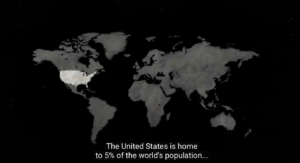
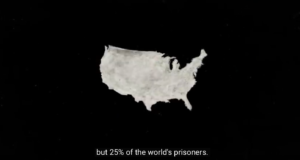
In the documentary Cobb explains that after slavery was abolished in the USA in 1865, a rapid transition took place into a mythology of black criminality. Black people were seen as criminals because of an introduction of these ideas in the newspapers of the time. White supremacy is at play. “White supremacy or white supremacism is the belief that white people are superior to those of other “races ” and thus should dominate them”. Slaves had been transported across the ocean to the USA and now they had been set free. The political establishment needed black people working. White people were unhappy with this and therefore created a false image of criminals creating fear of black people.
This prejudice still exists today.
Civil rights activists who rose after the Jim Crow law were also portrayed as criminals. The Jim Crow laws enforced racial segregation in the South of America. These laws were enforced until 1965. Rosa parks refused to give up her seat on a bus for a white man. She was arrested and portrayed as a criminal. Black people are human beings. This ties to what I have been speaking about all along. If we are sending human beings into incarceration, then the prison system should recognise it is caring for human beings and change its deeply rooted, dehumanising, racist ways.
Drug addiction is seen as a crime issue rather than a health issue. Drugs in America are rife in working class communities. These communities are often black people. In his essay, Race, Class and Drugs, William J Stuntz states
“the social harms from consensual crime tend to be concentrated where the downscale markets are–in poor urban neighborhoods. As a result, police and prosecutors tend to focus their attention not on drug crime generally, but on certain kinds of drug crime in certain kinds of neighborhoods. This enforcement strategy, in turn, tends naturally to produce racial or ethnic “tilts,” since poor urban neighborhoods are so often segregated along racial or ethnic lines. This process is not new”
As a result of more policing in areas where black and other minority groups are situated and a nation embedded in racist prejudice and structures and laws, of course we see a disproportionate amount of minority groups locked up behind bars.
The media has a key role in representation of poc, especially black men when it comes to incarceration in the USA. In 13th, Malkia Cyril, executive director of the centre of media in justice states “Black people, black men and black people in general are overrepresented in the news as criminals. When I say overrepresented I mean they are shown as criminal more times than accurate based on FBI statistics”. This to me shows that racism in the media surrounding prison and beyond exists in the world we live in today, whether it is conscious or unconscious bias. Media allows fear to be created and when fear is created in a society, it is easy for people to justify incarceration.
A culmination of long historic racism, and a failure to change the system, means the prison system is cyclically repeating all the wrongs of the past. People are being used for labour in prisons through a system called ALEC. ALEC are a group of legislators and business owners that make laws and invest money in the prison system. A steady influx of bodies generates profit that go shareholders in ALEC. Essentially this means that any investors in ALEC get rich off of punishment. Is this not a repetition of slavery in a more modern society?
Am I my brothers keeper?
An example of racism and importance of taking responsibility as a white person for what happens in these prisons is the Willie Martinez story. Below is a small excerpt from “Is William Martinez Not Our Brother?” by Buzz Alexander.
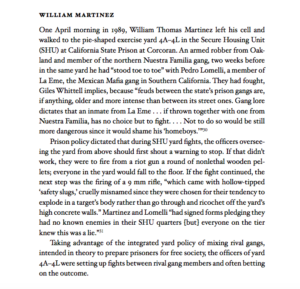
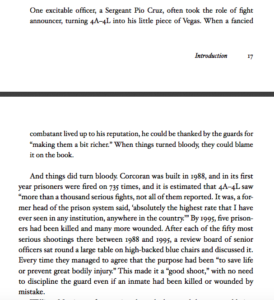
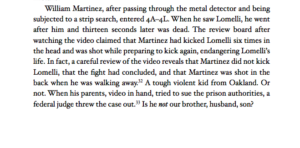
Contextualising issues is important. Who gets away with what? For example, a group of four white students take cocaine. They are not searched by police and can use “having a good time” as an excuse. Now in a community where cocaine is rife, there are more police. So another group of four black students get caught with cocaine. They are searched by the police because of the colour of their skin. More police are around because of reports of high usage of drugs in the area. The only thing different is context, skin colour and privilege.
This does not only happen in America, however it is important to recognise the mass scale on which it does happen there. This does not excuse the UK or anywhere else in the world. The gratification of ‘America is worse than here’ will not stand any longer. Yes, America is racist. So are we.
The United Kingdom spent approximately 4.37 billion pounds on its prison system in 2019/20. ( https://www.statista.com/statistics/298654/united-kingdom-uk-public-sector-expenditure-prisons/ ) Tax money pays for prisons. These justice services are acting on behalf of us. US. If incarceration is being acted out in our name, with our money, are we by-standing?
So am I my brothers keeper?
Are we not all in charge of looking out for each other?
What is my duty of care in all of this?
When are we going to address the problem of race within the prison system?
Resources –
https://www.ourdocuments.gov/doc.php?flash=false&doc=40
https://en.wikipedia.org/wiki/White_supremacy
https://www.britannica.com/event/Jim-Crow-law
Stuntz, William J. “Race, Class, and Drugs.” Columbia Law Review, vol. 98, no. 7, 1998, pp. 1795–1842. JSTOR, www.jstor.org/stable/1123466. Accessed 7 May 2021.
https://library.oapen.org/handle/20.500.12657/24015
https://www.statista.com/statistics/298654/united-kingdom-uk-public-sector-expenditure-prisons/
http://www.unodc.org/documents/wdr/WDR_2010/2.0_Drug_statistics_and_Trends.pdf

